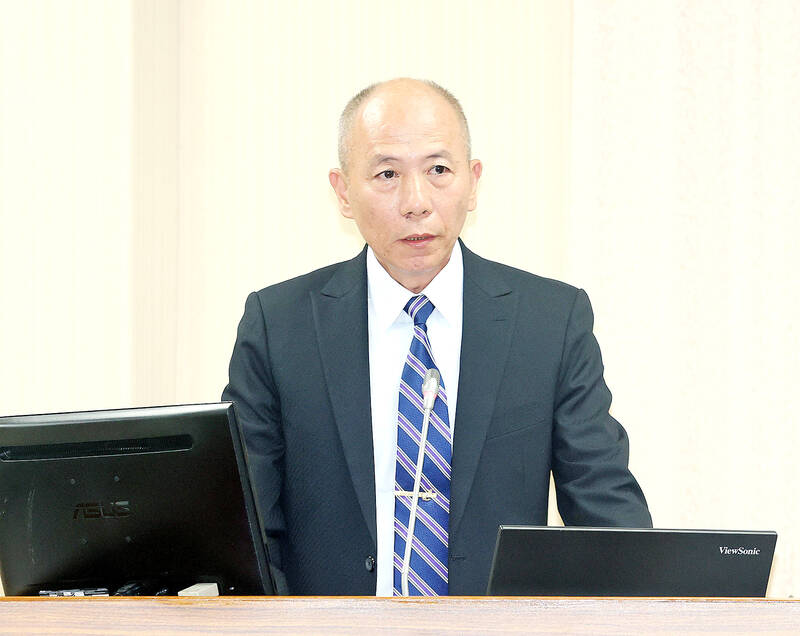The annual Han Kuang military exercises this year would be unscripted and not feature live-fire drills on Taiwan proper in a departure from previous iterations, Chief of the General Staff Admiral Mei Chia-shu (梅家樹) told lawmakers yesterday.
Mei made the remarks in a question-and-answer session on the exercises at a meeting of the legislature’s Foreign Affairs and National Defense Committee in Taipei, the first time a chief of the general staff had reported to lawmakers in nearly 25 years.
This year’s Han Kuang exercises are scheduled for July 22 to 26.

Photo: CNA
The design of this year’s military drills has undergone extensive changes focusing on familiarizing maneuver brigades with their operational environment and roles in war plans to address the rising threat from China, he said.
The exercises would emphasize realism and practicing decentralized command and control, and would not have scripts and rehearsals or the participation of marines and army special forces role-playing as opposition forces, he said.
That means the annual Lien Hsin marine corps amphibious assault drills and annual army special forces parachute drills would be held separately from Han Kuang exercises in another change from past practice, Mei said.
The former would be conducted early next month, while the latter would be held sometime after the Han Kuang exercises, he said.
Marines and special forces would instead focus on their assigned missions, operational environment, and command and control arrangements, he added.
When asked to clarify the partial omission of live-fire drills, Mei said troops based in the nation’s outlying islands would practice with live ammunition as before.
Military units based in Taiwan proper would conduct live-fire exercises separately, he said, adding that this year’s guided precision munition drills have increased in rigor.
Giving commanders freedom of action, clear areas of responsibility and rules of engagement, and ensuring units are capable of operating without being given orders are part of the distributed command and control capabilities that this year’s exercises would put to the test, he said.
Echoing Mei’s comments, Minister of National Defense Wellington Koo (顧立雄) told legislators that the canceled part of the live-fire drills was performative and that units have been allotted more live-ammo practice than in previous years.
Separately, Mei told reporters on the sidelines of the legislative meeting that he does not consider attending the committee meeting in person to be demeaning to the chief of the general staff’s office.
Should his appearance at the meeting instill a greater understanding for and appreciation of the armed forces in the public and media, going to the legislature would be worthwhile, he said.
Koo at the same impromptu news conference said that the admiral attended the session out of respect for lawmakers and that Ministry of National Defense officials believe the nation’s top commander in principle should answer their summons.
However, legislators should limit their questions to the annual military drills and not expect to summon the chief of the general staff as a matter of course, Koo said.

Taiwan has received more than US$70 million in royalties as of the end of last year from developing the F-16V jet as countries worldwide purchase or upgrade to this popular model, government and military officials said on Saturday. Taiwan funded the development of the F-16V jet and ended up the sole investor as other countries withdrew from the program. Now the F-16V is increasingly popular and countries must pay Taiwan a percentage in royalties when they purchase new F-16V aircraft or upgrade older F-16 models. The next five years are expected to be the peak for these royalties, with Taiwan potentially earning

STAY IN YOUR LANE: As the US and Israel attack Iran, the ministry has warned China not to overstep by including Taiwanese citizens in its evacuation orders The Ministry of Foreign Affairs (MOFA) yesterday rebuked a statement by China’s embassy in Israel that it would evacuate Taiwanese holders of Chinese travel documents from Israel amid the latter’s escalating conflict with Iran. Tensions have risen across the Middle East in the wake of US and Israeli airstrikes on Iran beginning Saturday. China subsequently issued an evacuation notice for its citizens. In a news release, the Chinese embassy in Israel said holders of “Taiwan compatriot permits (台胞證)” issued to Taiwanese nationals by Chinese authorities for travel to China — could register for evacuation to Egypt. In Taipei, the ministry yesterday said Taiwan

‘LIKE-MINDED PARTNER’: Tako van Popta said it would be inappropriate to delay signing the deal with Taiwan because of China, adding he would promote the issue Canadian senators have stressed Taiwan’s importance for international trade and expressed enthusiasm for ensuring the Taiwan-Canada trade cooperation framework agreement is implemented this year. Representative to Canada Harry Tseng (曾厚仁) in an interview with the Central News Agency (CNA) said he was increasingly uneasy about Ottawa’s delays in signing the agreement, especially as Ottawa has warmed toward Beijing. There are “no negotiations left. Not only [is it] initialed, we have three versions of the text ready: English, French and Mandarin,” Tseng said. “That tells you how close we are to the final signature.” Tseng said that he hoped Canadian Prime Minister Mark Carney

POSITIVE DEVELOPMENT: Japan and the US are expected to hold in-depth discussions on Taiwan-related issues during the meeting next month, Japanese sources said The holding of a Japan-US leaders’ meeting ahead of US President Donald Trump’s visit to China is positive news for Taiwan, former Japan-Taiwan Exchange Association representative Hiroyasu Izumi said yesterday. After the Liberal Democratic Party’s landslide victory in Japan’s House of Representatives election, Japanese Prime Minister Sanae Takaichi is scheduled to visit the US next month, where she is to meet with Trump ahead of the US president’s planned visit to China from March 31 to April 2 for a meeting with Chinese President Xi Jinping (習近平). Japan and the US are expected to hold in-depth discussions on Taiwan-related issues during the